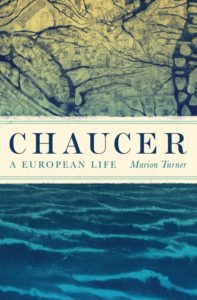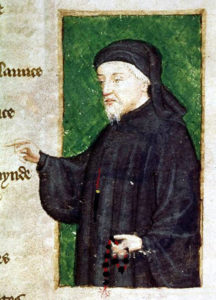In book publishing, reviews matter. Before I read Chaucer: A European Life by Marion Turner, I did something I always avoid doing before reading a book I intend to review. I read someone else’s review of the book.
I’d ordered the book (a hefty $39.95), and then I saw the headline on another reviewer’s story. It was not positive; in fact, what caught my attention was the outrage. Thinking of what I had spent on the book that was soon to arrive, I read the first few paragraphs. And my heart sank. The primary criticism was that the book was filled with misspelled words. This is a book written by an Oxford professor and published by Princeton University Press, and it has misspelled words?
And then the reviewer launched into what he saw as the work’s major shortcoming — no emphasis on, or even mention of, the importance of one particular influence (the church) on Chaucer’s life.

I started reading. For the first 50 pages, I kept looking for misspelled words but noticed none. The very first chapter is about the influence of the church on Chaucer’s childhood and later life. Was I reading the same book the reviewer had panned? I kept reading and found myself fascinated to learn things about Chaucer I hadn’t heard before. Where was that reviewer coming from?
I suspect he was reading what’s called an “ARC,” or advance reader’s copy, sent out by the publisher to a few reviewers. Anyone who’s read an ARC version of a book knows that there will be misspelled words, typos, and other imperfections; they are not the final versions sent to the press.
After reading Turner’s biography of the great English poet (1343-1400), I can confidently say it’s a major biographical work that significantly adds to understanding of his life, his writing, and, perhaps most of all, his greatest contribution to English literature, The Canterbury Tales.

Portrait of Chaucer from The Regiment of Princes (1411-1420) by Thomas Hoccleve.
Turner argues that, while Chaucer is certainly the father of English literature, he was shaped and extraordinarily influenced by European life and thought. She also makes the case for Chaucer being an unconventional and almost edgy poet, by comparing and contrasting his work with what was happening in English and European literature and poetry at the time.
The research underpinning the work is enormous. Turner goes well beyond the basic facts of Chaucer’s life (including the so-called “missing years” of 1357-1366) to discuss the critical importance of neighborhoods in medieval London, what Chaucer did on his many diplomatic journeys, power politics among English royalty and aristocrats (which Chaucer had to move adroitly through), the Black Death, the rise of the merchant class, and the importance of relics, faith, and pilgrimages. We even learn what Chaucer would have done in his years in the counting house, where he worked for a decade as a royal agent for the wool trade. Through it all, she connects this broad context and its individual elements to Chaucer’s writings.

Marion Turner
Turner is an associate professor, tutorial fellow, and director of Undergraduate Studies in the Faculty of English at Jesus College, Oxford. She is the author of Chaucerian Conflict: Languages of Antagonism in Late Fourteenth-Century London (2007) and served as editor of A Handbook of Middle English Studies (2013). She’s also published numerous articles on Chaucer, medieval illness narratives, and Chaucer contemporaries Thomas Usk and Thomas Hoccleve.
Chaucer: A European Life is an important book about the life and work of a man who had such great influence on both English literature and the English language. It places him in both his English and European contexts and demonstrates the importance of both. The book is also a major work of scholarship that is also interesting and engaging for non-academic readers.
It also stands as a warning about book reviews. Any review that begins and end in outrage may have some other purpose or ax to grind.
Photo by Simon Harrod, Creative Commons, via Flickr. Post by Glynn Young.
__________________________

“I require all our incoming poetry students—in the MFA I direct—to buy and read this book.”
—Jeanetta Calhoun Mish
- “Your Accent! You Can’t Be from New Orleans!” - October 9, 2025
- Poets and Poems: Donna Vorreyer and “Unrivered” - October 7, 2025
- Poet Sidney Lanier and the Lost Cause - October 2, 2025

Leave a Reply